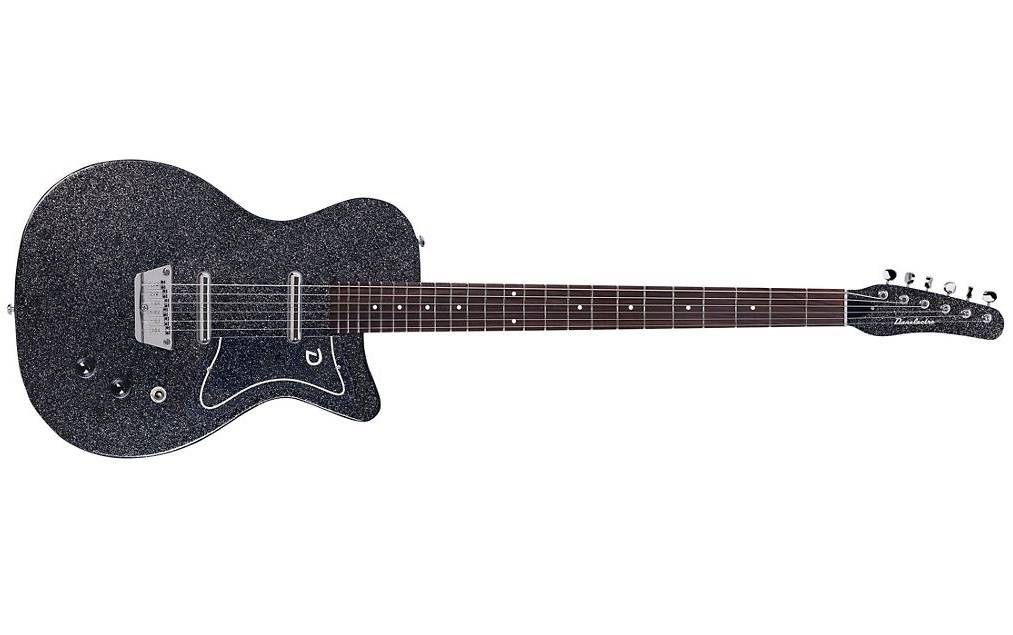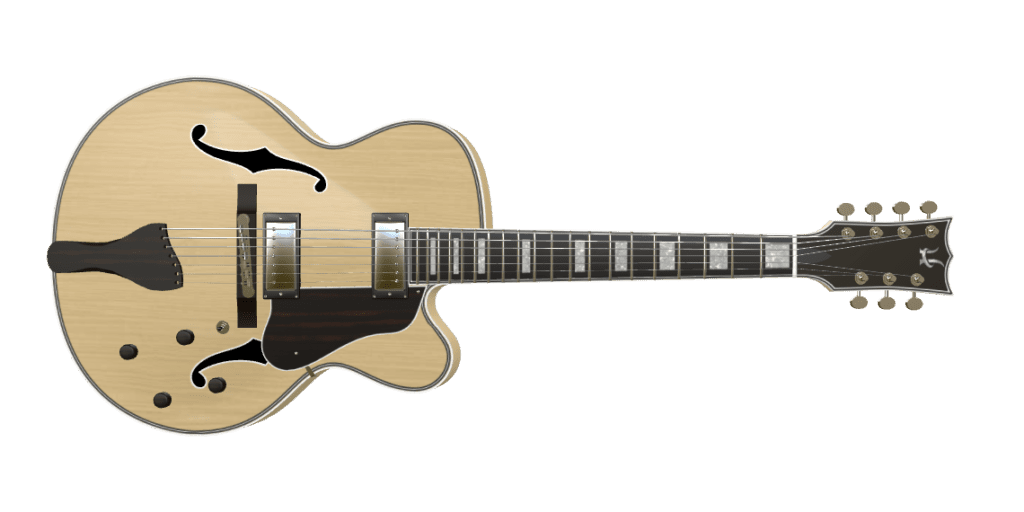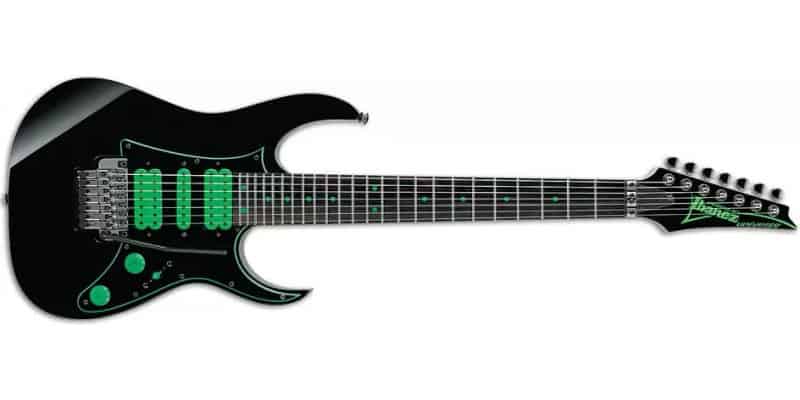The 7 string guitar has an extra string. Thank you for reading, hope you enjoyed our blog.
Oh, what? Did you expect more than that?
Ok, we can do better:
If you’re into heavier stuff, you might have wondered about what are the main differences between a baritone guitar and a 7 string guitar.
The quantity of strings is one of these differences, but of course, there are more, and we might even say that they are 2 completely different kinds of instruments.
If you just want a short answer, here it is:
The main differences between baritone and 7 string guitars are that the latter has a wider range of available pitches and a wider neck due to their extra string. Baritones, on the other side, have a longer scale length and, usually a bigger-sized body. Both of them are usually tuned with a low B1.
If you want to get a more in-depth analysis, stick with us.
In this article, we will lay out the main characteristics of a baritone guitar, and then we will talk about 7 string guitars. After that, we will talk about the main differences between these 2. Finally, we will give you our insights about which one you should choose, depending on what we think are important deciding factors
Are you ready?
Let’s get to it!
Baritone guitars main characteristics

The concept of a baritone instrument is not an innovation for the guitar world. What it just means is that it covers a lower range of pitches, or notes if you prefer it that way.
A baritone guitar usually has 6 strings and is not as low as an electric bass, but it sits well below a standard guitar.
This kind of guitars has a longer scale length, to make it possible for strings to be tuned lower while maintaining normal tension for a guitar.
Also, they use thicker string gauges, being the most common 13 (.013-.062) or 14 (.014-.068).
In some cases, the bodies of baritone guitars are also bigger.
Their most common tunings are:
- B1–E2–A2–D3–F♯3–B3
- A1–D2–G2–C3–E3–A3
- C2–F2–B♭2–E♭3–G3–C4
They were first introduced into modern pop culture by Danelectro in the late 1950s. After that, a lot of famous guitar brands like Gretsch, Fender, Gibson, Ibanez, PRS among others made their own versions, but always in small numbers.
The thigs is that, somehow, this kind of guitars has never become popular enough. And that’s a shame because they have such a unique sound.
In the early days, these guitars were usually used in surf rock and in film scores. In some cases doubling bass lines, and in others taking a more lead function.

Original baritones were intended to be played clean or slightly overdriven, but more modern iterations are, clearly, focused on heavier metal sounds. However, they surely will also sound amazing in a riff-heavy rock scenario.
7 string guitars main characteristics

Seven-string guitars are a simple concept: Just put a lower thicker string above the original six.
It didn’t need to be more complicated than that, and actually, it’s not really a modern concept. There are 7 string classic guitars dated to the renaissance period, around 200 years old.
But of course, these weren’t Schecter Hellraisers. And maybe that’s what you’re more interested in reading about.

In a more modern era, in the late 1930s, Epiphone built a seven-string for George Van Eps, a jazz guitar player. Later, they acquired certain popularity among other jazz players.
Enter the 2000s, nû metal, and all the “core” variants where 7 strings became ubiquitous. But actually, some classic 80s and 90s players like Steve Vai, John Petrucci, and Reb Beach had their go with the extra string before.
These are the most common 7-string guitar tunings:
- B1–E2–A2–D3–G3–B3–E4
- A1–E2–A2–D3–G3–B3–E4, dropped A
- E1-B1–E2–A2–D3–G3–B3, dropped E
The scale lengths for these monsters are usually the same as for six-string guitars, as are the string gauges used, with the obvious addition of a thicker string for the lower seventh.
In more modern designs some builders incorporate fanned frets which makes these guitars have a hybrid scale length. This makes the thicker strings be tuned lower while maintaining normal tension, as we said earlier.
Main differences between baritone guitars and 7 string guitars
In most styles, these 2 kinds of guitars can be somehow interchangeable in function.
To be honest, both baritones and seven strings share the idea of being just like a guitar, but lower.
So, let’s just put them side by side to point out the actual differences between baritone and 7 string guitars:
| Feature | Baritone guitar | 7 string guitar |
| Range of pitches | Normal | Wider |
| Scale length | Longer | Normal |
| String gauges | Thicker | Normal |
| Body sizes | Bigger | Normal |
| Neck sizes | Normal | Bigger |
| Most common tunings | B1–E2–A2–D3–F♯3–B3A1–D2–G2–C3–E3–A3C2–F2–B♭2–E♭3–G3–C4 | B1–E2–A2–D3–G3–B3–E4A1–E2–A2–D3–G3–B3–E4E1-B1–E2–A2–D3–G3–B3 |
As we can see, 7 string guitars obviously have a wider range of notes at their disposal because of their extra string.
The scale length of baritones is longer, as we said above, to help them retain a normal guitar string tension while having lower tunings.
String gauges are arguably thicker for baritones, but you can think that they’re just as the string gauges of a 7-string if you throw away the thinner string.
Body sizes are usually bigger in baritones, while neck sizes are mostly bigger in 7-strings to make space for the extra low one.
Which one should you choose?
Here in GearAficionado, we don’t like pointing you in one direction blindly. We think that buying a guitar, for instance, is a very personal thing and that you should make the final decision on your own.
We always encourage you to go and try the gear for yourself, and if it’s possible to compare your options side by side.
However, we can give you some insights into what we think you are more likely to prefer:
- If you have smaller hands, the thinner neck of a baritone guitar might be more comfortable for you
- If you are a lead player and really need that high string, you should go for a 7 string
- If you are a big guy, the bigger body of a baritone might suit you better
- If you are not a very big guy, a normal-sized guitar body of a 7 string might be more comfortable for you
- If you play surf rock or enjoy the sound of low clean guitar sounds, get a vintage baritone
- If you are a jazz player who could give great use to that extra low string for walking bass lines, get a 7 string hollow-body guitar

Hello there, my name is Ramiro and I’ve been playing guitar for almost 20 years. I’m obsessed with everything gear-related and I thought it might be worth sharing it. From guitars, pedals, amps, and synths to studio gear and production tips, I hope you find what I post here useful, and I’ll try my best to keep it entertaining also.





